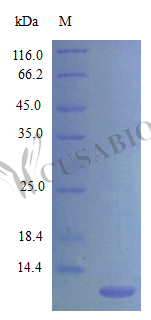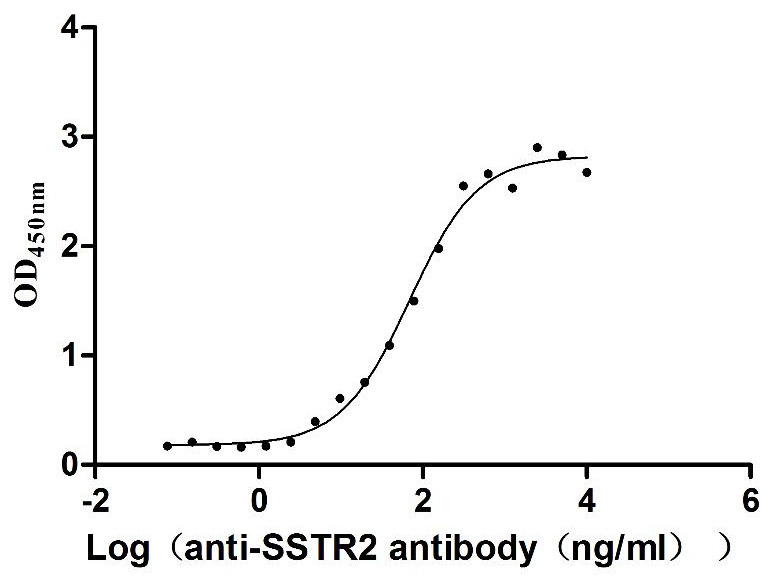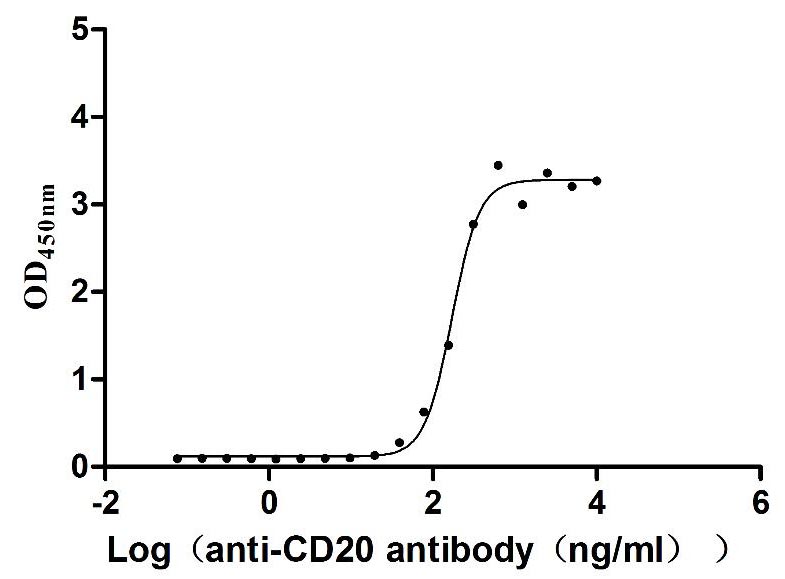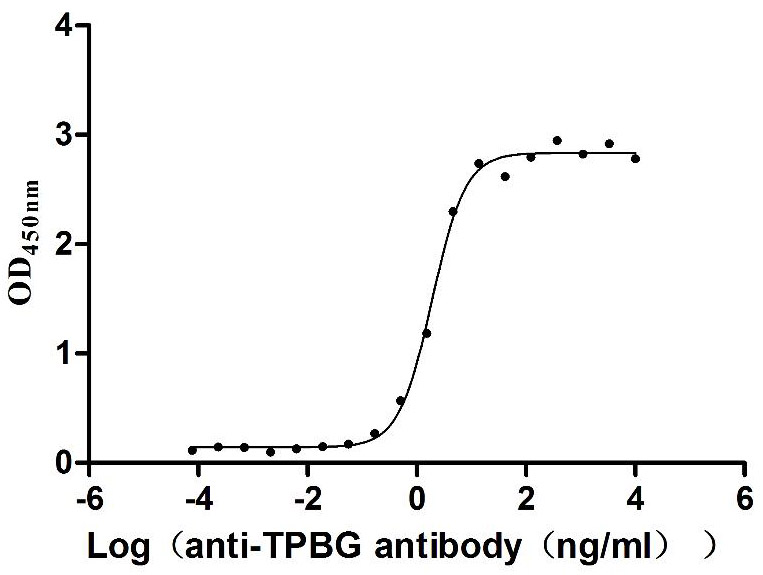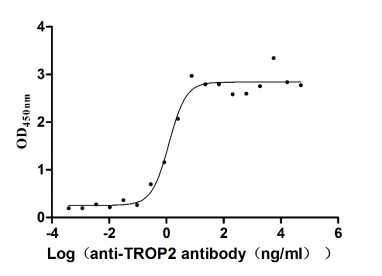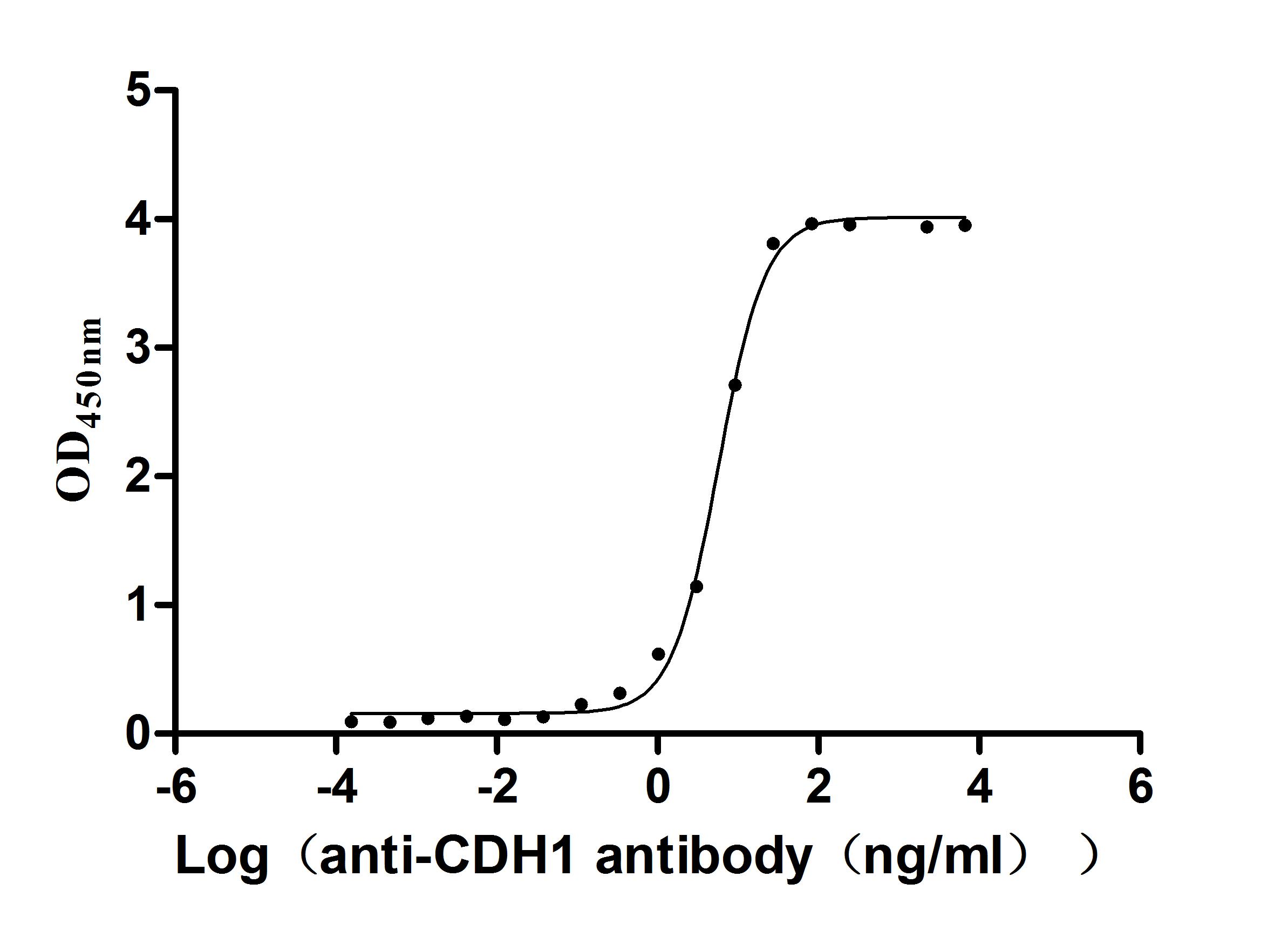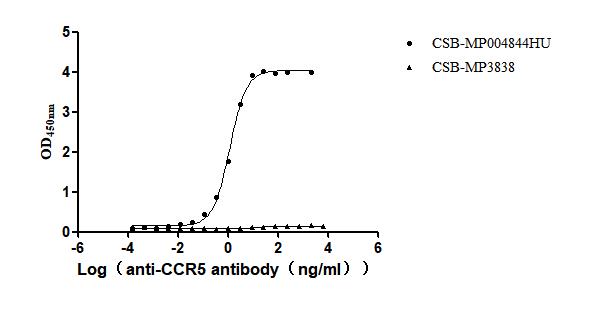Recombinant Mouse C-C motif chemokine 20 protein (Ccl20)
In Stock产品详情
-
纯度:>96% as determined by SDS-PAGE.
-
内毒素:Less than 1.0 EU/μg as determined by LAL method.
-
生物活性:Fully biologically active when compared to standard. The biologically active determined by a chemotaxis bioassay using human CCR6 transfected murine BaF3 cells is in a concentration range of 0.1-10 ng/ml.
-
基因名:
-
Uniprot No.:
-
别名:Ccl20; Larc; Scya20C-C motif chemokine 20; Beta-chemokine exodus-1; CC chemokine LARC; CC chemokine ST38; Liver and activation-regulated chemokine; Macrophage inflammatory protein 3 alpha; MIP-3-alpha; Small-inducible cytokine A20
-
种属:Mus musculus (Mouse)
-
蛋白长度:Full Length of Mature Protein
-
来源:E.Coli
-
分子量:8.0 kDa
-
表达区域:28-97aa
-
氨基酸序列ASNYDCCLSY IQTPLPSRAI VGFTRQMADE ACDINAIIFH TKKRKSVCAD PKQNWVKRAV NLLSLRVKKM
-
蛋白标签:Tag-Free
-
产品提供形式:Liquid or Lyophilized powder
Note: We will preferentially ship the format that we have in stock, however, if you have any special requirement for the format, please remark your requirement when placing the order, we will prepare according to your demand. -
缓冲液:0.2 μm filtered PBS, pH 7.4 ,lyophilized
-
储存条件:Store at -20°C/-80°C upon receipt, aliquoting is necessary for mutiple use. Avoid repeated freeze-thaw cycles.
-
保质期:The shelf life is related to many factors, storage state, buffer ingredients, storage temperature and the stability of the protein itself.
Generally, the shelf life of liquid form is 6 months at -20°C/-80°C. The shelf life of lyophilized form is 12 months at -20°C/-80°C. -
货期:5-10 business days
-
Datasheet & COA:Please contact us to get it.
相关产品
靶点详情
-
功能:Acts as a ligand for C-C chemokine receptor CCR6. Signals through binding and activation of CCR6 and induces a strong chemotactic response and mobilization of intracellular calcium ions. The ligand-receptor pair CCL20-CCR6 is responsible for the chemotaxis of dendritic cells (DC), effector/memory T-cells and B-cells and plays an important role at skin and mucosal surfaces under homeostatic and inflammatory conditions, as well as in pathology, including cancer and autoimmune diseases. CCL20 acts as a chemotactic factor that attracts lymphocytes and, slightly, neutrophils, but not monocytes. Involved in the recruitment of both the proinflammatory IL17 producing helper T-cells (Th17) and the regulatory T-cells (Treg) to sites of inflammation. Required for optimal migration of thymic natural regulatory T cells (nTregs) and DN1 early thymocyte progenitor cells. Positively regulates sperm motility and chemotaxis via its binding to CCR6 which triggers Ca2+ mobilization in the sperm which is important for its motility. May be involved in formation and function of the mucosal lymphoid tissues by attracting lymphocytes and dendritic cells towards epithelial cells.
-
基因功能参考文献:
- Obesity-induced IL-6 shifts macrophage polarization towards tumor-promoting macrophages that produce the CCL-20 in the colitis-associated colorectal cancer (CAC) microenvironment. CCL-20 promotes CAC progression by recruiting CCR6-expressing B-cells and gammadelta T cells via chemotaxis. PMID: 29695802
- Blocking or knockdown CCN1 expression ameliorated skin inflammation and reduced the expression of CCL20 in both imiquimod and IL-23-induced psoriasis-like mouse models. PMID: 28602508
- these data indicate that CCL20/CCR6 signaling may play an important role in regulating bone mass accrual, potentially by modulating osteoblast maturation, survival, and the recruitment of osteoblast-supporting cells. PMID: 26890063
- We crossed Ptf1a(Cre/+) ;Kras(G12D/+) mice with JNK1(-/-) mice to generate Ptf1a(Cre/+) ;Kras(G12D/+) ;JNK1(-/-) (Kras;JNK1(-/-) ) mice. Tumor weight was significantly lower in Kras;JNK1(-/-) mice than in Kras;JNK1(+/-) mice, whereas histopathological features were similar.we concluded that inhibition of activated JNK in pancreatic tumor stroma could be a potential therapeutic target to increase Ccl20 secretion PMID: 28837246
- mutually exclusive transcriptional regulation by AP-1 (cjun/cfos) and non-canonical NF-kappaB (RelB/p52) downstream of MEK-ERK and NIK-IKK-alpha-NF-kappaB2 (p100) phosphorylation, respectively was responsible for persistent Ccl20 expression in the colonic cells. PMID: 27590109
- Taken together, these data show that, in adipose tissues, IL-17A contributes to exacerbating insulin resistance-enhancing IL-6 production and promotes the infiltration of Th17 cells in cooperation with TNFalpha; these findings represent a novel hypothesis for the association between IL-17A-producing cells and type 2 diabetes. PMID: 27311858
- Data (including data from studies in knockout/mutant mice) suggest that expression of Ahr (aryl-hydrocarbon receptor) and its translocation into nucleus are necessary for Ahr ligand-mediated synergistic induction of Ccl20; here, TCDD is Ahr ligand. PMID: 26259605
- alpha-hemolytic streptococcus may exacerbate kidney damage in IgA nephropathy through CCL20 response to the effect of Th17 cells. PMID: 25265199
- Acquired mtDNA mutations may promote tumorigenic phenotypes through up-regulation of chemokine CCL20. PMID: 25177208
- Overexpression of CCL20 in human proximal tubular cells is inhibited by blockade of KCa3.1 under diabetic conditions through inhibition of the NF-kappaB pathway. PMID: 24733189
- Our data indicate that estradiol is important in regulating the effects of keratinocyte growth factor on mouse uterine epithelial cell secretion of CCL20 and CXCL1. PMID: 24807244
- CCL20 blockage lead to a diminished cerebral immune response in experimental pneumococcal meningitis. PMID: 24699535
- This study suggests that CCL20/IL-15 can induce a strong antitumor immune response in tumor tissues and it is a suitable candidate for cancer immunotherapy. PMID: 24657179
- Estrogen receptors alpha regulates CCL20/CXCL1 secretion in the female reproductive tract. PMID: 23025258
- Cardiac fibroblasts could recruit Th17 cells infiltration into myocardium by secreting CCL20 in acute viral myocarditis. PMID: 24296428
- Data indicate that a CCR6/CCL20 chemokine loop instructed rapid increase of B cells in the spleen in response to systemic administration of Nod1 agonists in a TNF-alpha-dependent manner. PMID: 24534531
- Neutralization of CCL20 before induction of sepsis increased mortality during sepsis accompanied with increasing epithelial apoptosis in the jejunum and augmenting serum TNF-alpha. PMID: 23601903
- CXCR3 promotes recruitment of Th17 cells from the blood into the liver in both human and murine liver injury. Their subsequent positioning near bile ducts is dependent on CCR6 and cholangiocyte-secreted CCL20. PMID: 22796894
- Findings suggest that TNF-alpha is essential in the induction of autoimmune hepatitis (AIH) through upregulation of hepatic CCL20 expression, which allows migration of dysregulated splenic T cells. PMID: 23178752
- Regulation of CCL20 expression in astrocytes is stimulated by the addition of interleukin (IL)-6, IL-6 soluble receptor, and IL-17. PMID: 22319003
- Tumor-associated macrophages recruit CCR6+ regulatory T cells and promote the development of colorectal cancer via enhancing CCL20 production in mice PMID: 21559338
- the healing response to corneal epithelial abrasion includes CCL20-dependent influx of CCR6(+) IL-17(+) IL-22(+) gammadelta T cells, and IL-22 contributes to the inflammatory response and promotes epithelial healing PMID: 21518851
- IL-9 is produced by several T helper (Th) cell subsets in the presence of IL-4 and induces CCL-20 production by astrocytes to induce the migration of Th17 cells into the central nervous system. PMID: 21346235
- Data show that the synergistic actions of pGM-CSF and pMIP3alpha presents a potentially feasible means of controlling immunogenic malignancies and provides a basis for the development of novel immunotherapeutic treatments. PMID: 20804501
- CCL20 is important in mediating leukocyte recruitment early upon infection with respiratory syncytial virus. PMID: 20101616
- Interfering with CCL20 significantly downregulates the expression of CD4(+)CD25(+) T cell development in mouse thymus. PMID: 18315924
- through secretion of CCL20, astrocytes could play an important role in orchestrating the recruitment of specific leukocyte subsets to the inflamed CNS and in regulating CNS-targeted immune responses. PMID: 12528183
- In experimental autoimmune encephalitis MIP-3 alpha is required for sensitization of T cells to antigen and for release of T cells from lymph nodes during the course of an immune response. PMID: 12794163
- CCL20 plays a vital role in B-cell adhesion to the inflamed endothelium PMID: 12816871
- our findings indicate that blockade of MIP-3alpha bioactivity can significantly reduce TNBS-mediated colonic injury and T cell recruitment, suggesting a role for this chemokine in the pathophysiology of intestinal inflammation. PMID: 17272517
- CXCL12-CXCR4 and CCL20-CCR6 systems are involved in T lymphocyte-endothelial interaction in microvessels of the small and large intestines. PMID: 17885999
- The joint cytokine milieu formed by T cells and synovial cells controls the production of CCL20 and, consequently, the recruitment of chemokine receptor 6 arthritogenic Th cells to the inflamed joints. PMID: 18025126
- Our studies suggest that TLR4 expressed by tumor cells may be involved in the induction of chemokines like CCL20. PMID: 18083111
- Th17 cytokines stimulate CCL20 production in vitro and in vivo, and thus provide a potential explanation of how CCR6-positive Th17 cells maintain their continual presence in psoriasis through a positive chemotactic feedback loop. PMID: 19295614
- Investigated the regulation of ccl20 expression and found different NF-kappaB pathways modulate CCL20 transcription by operating on the same NF-kappaB binding site in the same cell type. PMID: 19303953
- the CCR6-CCL20 axis in the choroid plexus controls immune surveillance of the CNS. PMID: 19305396
显示更多
收起更多
-
亚细胞定位:Secreted.
-
蛋白家族:Intercrine beta (chemokine CC) family
-
组织特异性:Thymic medulla (at protein level). Prominently expressed in the small intestine, colon and appendix. Also found in thymus, spleen, lymph node and lung. The long form might be dominant in intestinal, and the short form in lymphoid tissues. Expressed by IL1
-
数据库链接:
KEGG: mmu:20297
STRING: 10090.ENSMUSP00000109064
UniGene: Mm.116739
Most popular with customers
-
Recombinant Human Somatostatin receptor type 2 (SSTR2)-VLPs (Active)
Express system: Mammalian cell
Species: Homo sapiens (Human)
-
Recombinant Dog B-lymphocyte antigen CD20 (MS4A1)-VLPs (Active)
Express system: Mammalian cell
Species: Canis lupus familiaris (Dog) (Canis familiaris)
-
Recombinant Macaca fascicularis Trophoblast glycoprotein (TPBG), partial (Active)
Express system: Mammalian cell
Species: Macaca fascicularis (Crab-eating macaque) (Cynomolgus monkey)
-
Recombinant Human Tumor-associated calcium signal transducer 2 (TACSTD2), partial (Active)
Express system: Mammalian cell
Species: Homo sapiens (Human)
-
Recombinant Human Cadherin-1(CDH1),partial (Active)
Express system: Mammalian cell
Species: Homo sapiens (Human)
-
Recombinant Human C-C chemokine receptor type 5 (CCR5)-VLPs (Active)
Express system: Mammalian cell
Species: Homo sapiens (Human)

